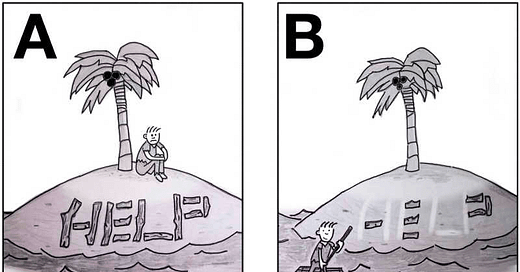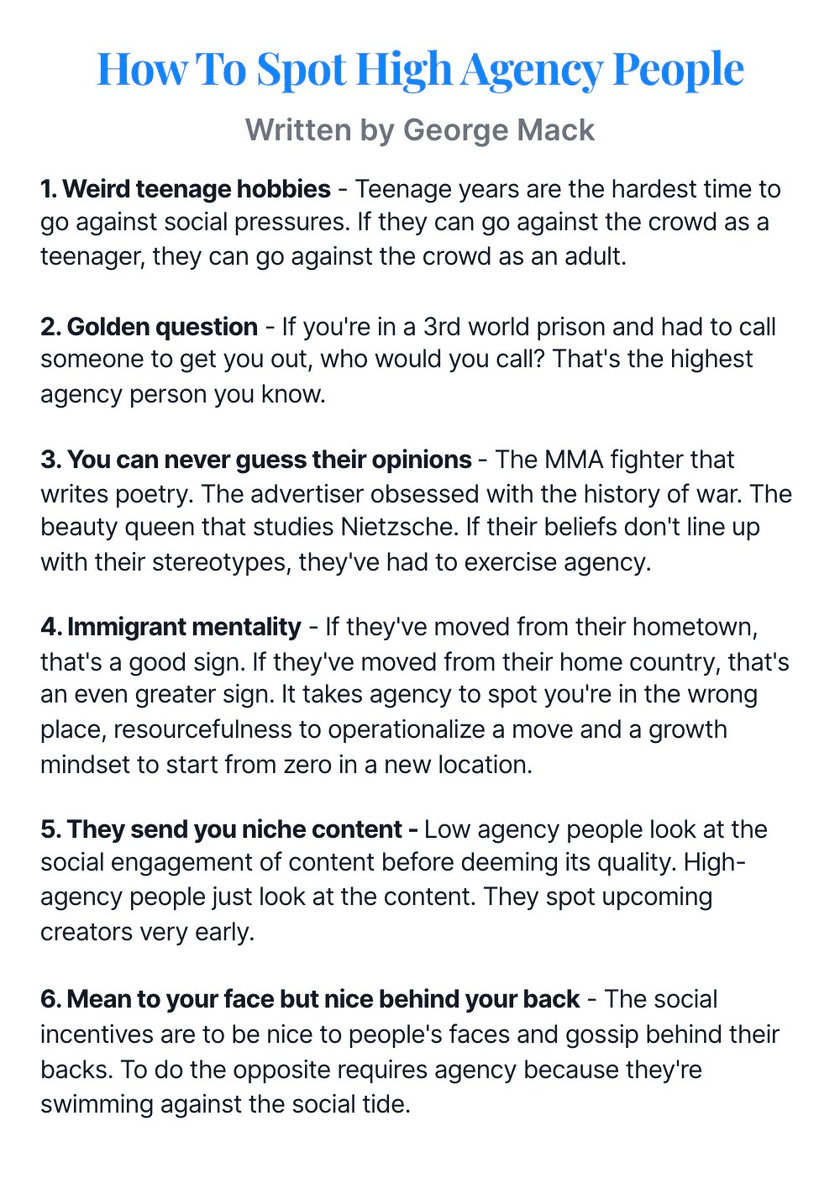I’ve come across a thinker I like called George Mack. This week he wrote:
If presented with two equal candidates for a role, pick the one with the least amount of charisma. The uncharismatic one has got there despite his lack of charisma. The charismatic one has got there with the aid of their charisma.
Here’s another one:
If you have two quality people that would benefit from an intro to each other, always do it. Networks don’t divide as you share them, they multiply.
And I love the list of traits he offers about what he calls “high agency people”. I hadn’t heard that term before but I think it describes my very best friends. As a high agency person himself George has turned the list into a jpeg that can’t be shared without his details on it. Good for him.
Sometimes I wonder if bumper sticker style advice like the above is just Instagram poetry dressed up as something more intellectual. But I find that I think about his observations - even model my own behaviour on them - often enough that they must be genuine insights.
*****
Here’s another insight I often think about, from an expert on conspiracy theories who I interviewed a couple of years ago. It can be easy to accuse someone of being a conspiracy theorist, and easy for them to refute it. But he suggested a pretty good test for dividing the grey into black and white.
Let’s say someone believes that the earth is flat. He says you should ask them one simple question:
“What evidence would you need to see in order to change your mind?”
If the answer is “nothing could change my mind”, then they might be beyond help.
I think that’s a good way of interrogating your own beliefs too. If you take a social or political position that you feel strongly about - that free lunches in schools provide a good return on investment, say, or that a Universal Basic Income will improve society - what evidence would make you change your mind?
I’m not saying that the wrong answer makes you a full conspiracy theorist, but I guess I’m suggesting that if your first response to evidence that contradicts your beliefs is to ignore it and wait for the right kind of evidence to arrive (or to suggest the person presenting it has impure motives), you may be falling into the sort of thinking that traps conspiracy theorists into their own more ludicrous positions.
****
A 2018 US study found that white liberals are more likely than conservatives to talk down to black people. At the time, one media outlet explained the research thus:
You have recently joined a book club.
Before each meeting, one member of the literary collective sends an email to the club secretary offering a few thoughts on the assigned text. This month, it’s your turn to compose the brief review.
A new study suggests that the words you use may depend on whether the club secretary’s name is Emily (“a stereotypically White name,” as the study says) or Lakisha (“a stereotypically Black name”). If you’re a white liberal writing to Emily, you might use words like “melancholy” or “euphoric” to describe the mood of the book, whereas you might trade these terms out for the simpler “sad” or “happy” if you’re corresponding with Lakisha.
But if you’re a white conservative, your diction won’t depend on the presumed race of your interlocutor.
The research might seem counterintuitive to liberals - who would surely feel they’re part of the solution, not part of the problem. But counterintuitive research makes for interesting thought experiments.
If you’re liberal yourself, I wonder what your gut reaction is - to take the bad news on the chin? To check the source of my quote for liberal bias (it’s from The Washington Post)? To Google the study to try and find clever people who’ve pulled the methodology apart and shown that it’s hopelessly flawed? I haven’t done that Google search myself and perhaps there is further interesting commentary out there (or further down in the paywalled article). But I think having some awareness of how your brain reacts in a moment like this is a useful first step in moving towards evidence-based rather than partisan-based argument.
*****
I wrote a couple of months ago how there was a restaurant I just could not get into. Well, I got in, and it was worth it for this panna cotta:
You can read my review of Bianca in Ellerslie here.
Have a great week!






🙋🏾♀️Thanks for some thought provoking observations that aren't (directly) about sports or politics 😉
I like your George Mack quotes - but of course it depends on the role being filled whether "charisma" is a good or bad trait? Probably a back room data analyst needs less but a PR front person needs SOME at least?? Love the "high agency" list - most neuro-diverse people would score high (highly?) on that!
The study purporting to show that white liberals are more likely to talk down to black people certainly needs more nuance, & I'm not interested enough to follow up. However an initial thought is that it could be a bias towards inclusivity - it is/was a FACT that black Americans were disproportionately likely to leave education before gaining higher levels of "achievement" so the liberal doesn't want the perceived black person to feel you are flexing your superior education & command of words to show them up? And is it REALLY "talking down" per se? Maybe just self-awareness of a propensity to use big words when simple words convey the same meaning?
😁As a definite non-foodie, I can still be happy for YOU that you achieved your wish & it didn't disappoint on this occasion 😸